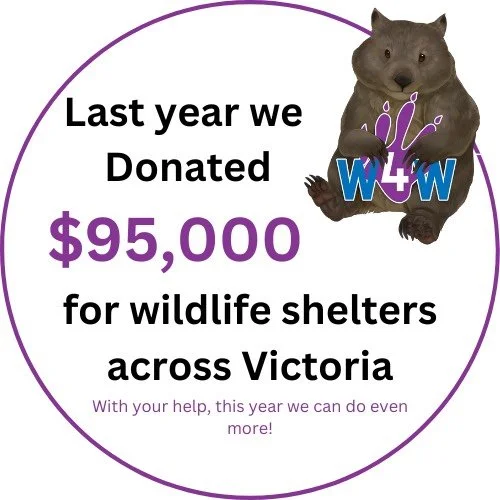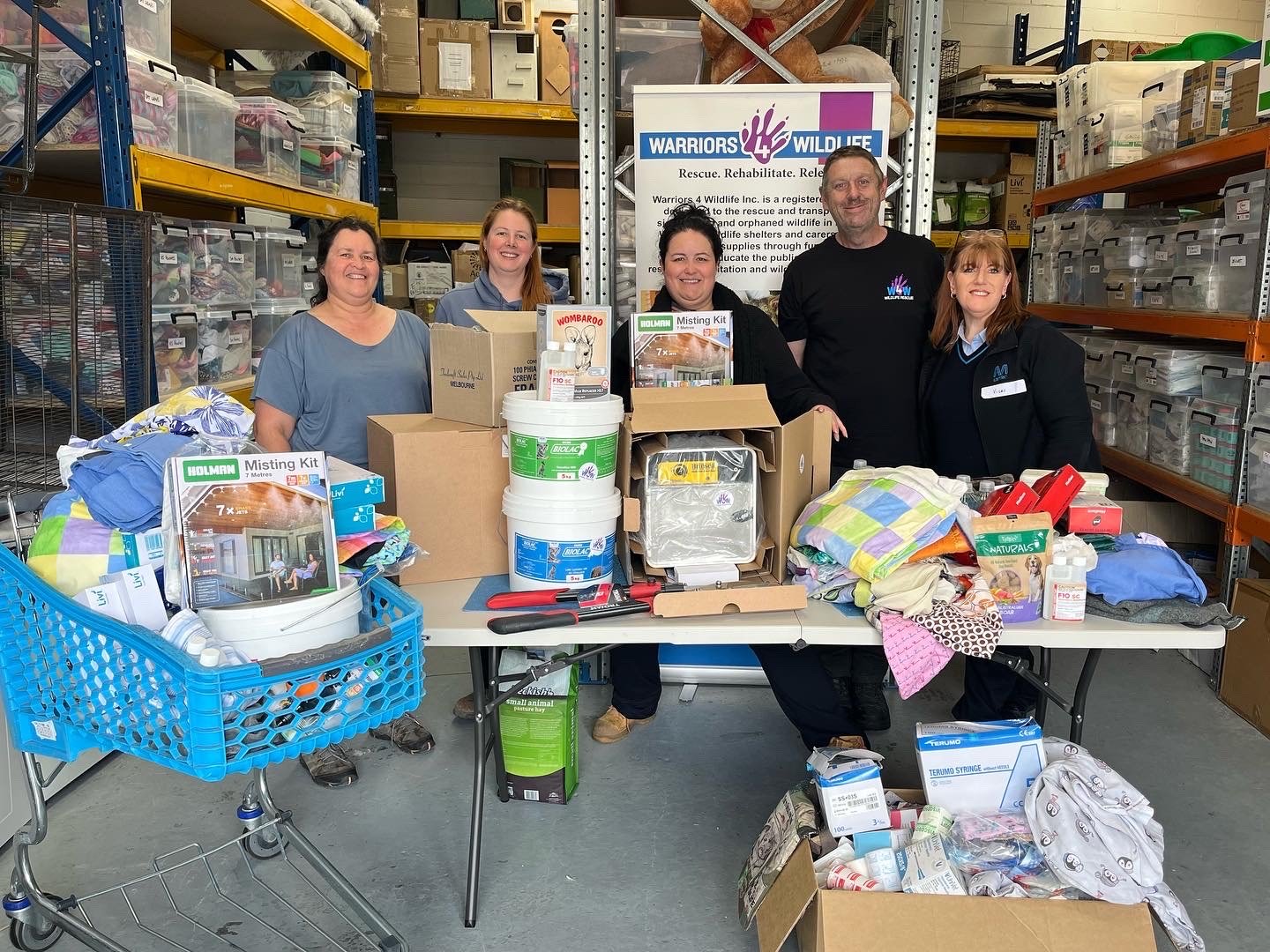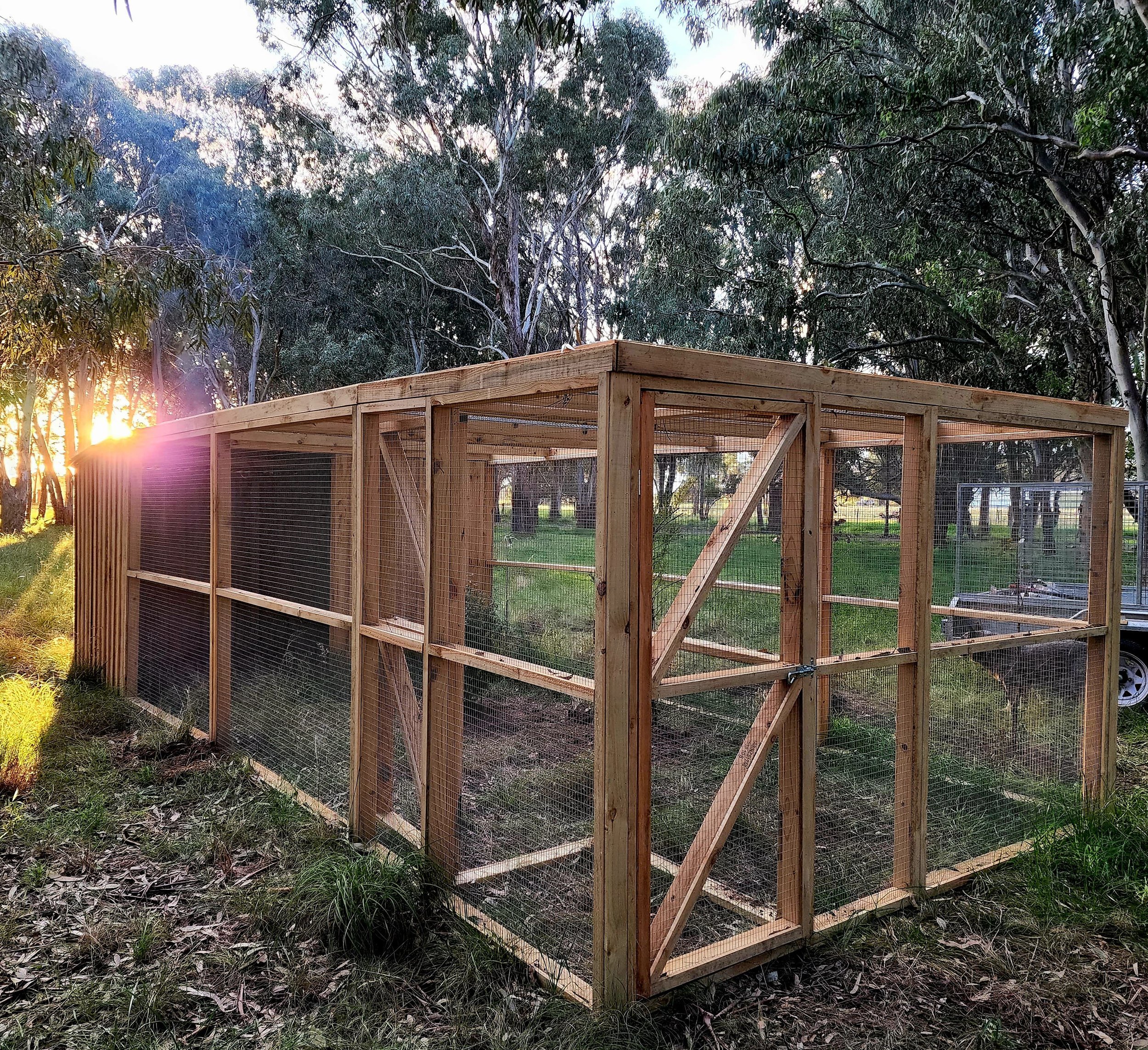
SUPPORT 4 SHELTERS
How We Can Help
Wildlife shelters are everyday hero’s that receive little to no funding at all for the enormous task of rehabilitating sick, injured or orphaned wildlife. Animals need to be rescued and brought into care, some animals are in care for weeks and even months and is very costly.
W4W strives to ease that burden in any way we can ensuring wildlife shelters and our wildlife survive well into the future. Here are some of the ways Warriors 4 Wildlife raises much needed funds to support them.
“Thank-you Warriors 4 Wildlife for this boot load of Kangaroo food - Oaten chaff, Kangaroo pellets & equestrian complete + 2 tins of possum milk. This has saved me nearly $200 and will feed 7 joeys & 2 possums for a few weeks. “
Sues Roo’s
Help is Here
In 2021 we were excited to launch our new warehouse and distribution hub in Narre Warren to provide ongoing support for our wonderful wildlife shelters and rehabilitators
The Warehouse provides an ongoing resource to aid our Shelters in the Rescue and Rehabilitation of our wildlife.
Thank you to everyone who has donated, sponsored and supported us including our amazing volunteers. We couldn’t have done this without you.
We hope W4W can continue to give support to shelters for years to come. #support4shelters
If you are a shelter needing support, please use the link below to contact our Shelter Support Co-ordinator.
Ongoing Donations
Warriors 4 Wildlife’s Support 4 Shelters program aims to provide assistance to Victoria’s wildlife shelters by way of ongoing donations. We do this through the supply of:
Medical supplies and equipment - eg. bandages, syringes, hypodermic needles, gauze, saline and burn creams.
Food - Kangaroo pellets, hay, bird seed and fruit and vegetables.
Daily items - Pouches, towels, pillow cases, heat packs, bowls, natural unscented cleaning supplies.
Larger equipment - Aviairies, transport containers, incubators, possum boxes and dreys etc.
To the hardworking shelters and carers that rehabilitate our native wildlife we acknowledge your dedication and we are here to help.
How we Help
Transport or Volunteer Assistance
If you are a shelter in need of an animal being transported to or from your shelter feel free to reach out to us for assistance. We also have an amazing team of warriors that would love to regularly volunteer at wildlife shelters. We can help find people in your area to assist you with your daily chores.
Working Bee’s
Many hands mean light work! Building infrastructure and cleaning equipment all takes time and lots of effort. Our organisation offers shelters and carers opportunities to request a team of W4W Volunteers to come out and help them with a full or half day working bee at their shelter. Our warriors will assist in whatever is needed to help build and maintain their shelters. If you are a shelter or carer and would love for a team to come and assist your shelter, please contact us to see how we can assist.
Why Our Program Is Important
Warriors 4 Wildlife’s Support 4 Shelters program is a cornerstone initiative designed to bolster Victoria’s wildlife shelters and carers by providing essential resources, volunteer support, and funding to aid in the rescue, rehabilitation, and release of native wildlife. The program addresses the critical needs of shelters, which often operate with limited government funding and rely heavily on public donations and volunteer efforts.
The Support 4 Shelters program is vital for several reasons, aligning with the broader goals of wildlife rehabilitation in the face of Australia’s biodiversity crisis, where native wildlife face threats from urbanization, land clearing, climate change, and high extinction rates:
• Sustaining Species Populations: By equipping shelters with the resources to rehabilitate injured, sick, or orphaned animals, the program helps maintain populations of vulnerable species. For instance, supplying incubators and milk formulas ensures that orphaned joeys and other young animals survive to be released, bolstering species like kangaroos, koalas, and possums. This is critical in Australia, where extinction rates are among the highest globally.
• Preserving Biodiversity: Shelters supported by the program play a key role in conserving biodiversity by rehabilitating animals that fulfill essential ecological roles, such as pollination, seed dispersal, or pest control. The program’s provision of enclosures and food supports diverse species, from reptiles to birds, ensuring ecosystems remain balanced and resilient.
• Compassionate Care for Individual Animals: The program enables shelters to provide high-quality care to each animal, reflecting an ethical commitment to alleviating suffering. Supplies like medical equipment and pouches ensure animals receive proper treatment, while volunteer transport services ensure timely access to care, giving each animal a chance to recover and return to the wild.
• Easing Shelter Burdens: Wildlife shelters, often run by volunteers with minimal funding, face significant financial and logistical challenges. The program’s donations and volunteer support reduce these burdens, allowing shelters to operate effectively.
• Building Community Resilience: By involving the community in fundraising, volunteering, and education, the program strengthens public support for wildlife conservation. This collective effort enhances the sustainability of shelter operations and raises awareness of the plight of Australia’s wildlife, fostering a culture of stewardship.
The Support 4 Shelters program is a lifeline for Victoria’s wildlife shelters, empowering them to combat the impacts of human-driven threats and natural disasters. By providing resources, funding, and volunteer support, the program ensures shelters can continue their critical work, safeguarding Australia’s native wildlife for future generations.
Some more shelters receiving necessary and much needed items to help rehabilitate wildlife in care
Our volunteer Linda took our Wildlife Rescue Vehicle loaded with donations to deliver to Geoff at Treehouse Wildlife Refuge Metung who helped us to distribute the supplies to carers in the Gippsland area. Car incubators, pouches, kangaroo bags, medical and cleaning supplies and feed for the animals were donated
Animalia Wildlife Shelter and Elouera Wildlife Shelter also came to our warehouse and went shopping for some supplies they needed
Our Support 4 Shelters program and Wildlife Support Centre is a vital service for the wildlife community Building valuable connections, resilience within the community and contributing to the preservation of our native wildlife





















